This report is compiled on the basis of the 2016 annual reports of the people’s governments of all districts in Beijing and the commissions, offices and bureaus of the Beijing Municipal Government in accordance with the requirements of the Regulations on the Openness of Government Information in People’s Republic of China (PRC), the Notice of the General Office of the State Council, the General Office of the Central Committee of the CPC on Printing and Distributing the Opinions on Comprehensively Promoting the Openness of Government Affairs, the Notice of the General Office of the State Council on Printing and Distributing the Key Points of the Openness of Government Affairs in 2016 and the Provisions on the Openness of Government Information in Beijing.
The full text includes the key work of Beijing municipal government information and government affairs disclosure in 2016, the information disclosure in key areas, the existing shortcomings and improvement measures, as well as the relevant data of government information disclosure, such as voluntary disclosure, response interpretation, disclosure upon application (including non-disclosure, fee reduction and exemption), administrative reconsideration, administrative litigation and reporting.
The statistical period of the data listed in this report is from January 1, 2016 to December 31, 2016. The electronic version of this report can be downloaded from the "Window of the Capital" portal (http://www.beijing.gov.cn/). If you have any questions about the report, please contact the Beijing Municipal Government Information and Government Affairs Open Office (Address: Beijing Municipal Government Information Open Hall, No.70 Zaolinqian Street, Xicheng District, Beijing; Postal code: 100053; Tel: 010-83978888; E-mail: xxgk@beijing.gov.cn).
This report is prepared according to the requirements set out by Regulations Regarding Disclosure of Government Information of the PRC and Provisions f or Disclosure of Government Information of Beijing Municipality; and it is based on the 2016 annual reports prepared by district-level governments of Beijing Municipality as well as municipal government bodies, including commissions, offices and bureaus.
The report contains key points of the work of Beijing Municipality on government information disclosure in 2016; the disclosure of information in key areas; problems and measures for improvement; and related data on voluntary information disclosure, responses and interpretation, disclosure upon requests (including information on the non-open contents, fees and fee relief), administrative reconsideration, administrative litigation, and tip-offs, etc.
The statistics in this report is collected from the period starting from January 1st, 2016 to December 31st, 2016. The electronic version of the report is available for download at http://www.beijing.gov.cn . For any enquiries about the report, please contact the Government Information Disclosure Office of Beijing Municipal Government. (Address: No. 70, Zaolin Qianjie Street, Xicheng District, Beijing 100053, Government Information Disclosure Service Hall of Beijing Municipality; Tel: 010-83978888; E-mail: xxgk@beijing.gov.cn )
First, the key work situation
(A) to strengthen the top-level design, to promote a good start in government affairs.
Integrate and establish the municipal government information and government affairs disclosure work organization. The adjustment of the municipal government affairs leading group, headed by the Standing Committee of the Municipal Party Committee and the executive deputy mayor. The work of making government affairs public is included in the division of work of the executive vice mayor of the municipal government and made public. The establishment of the municipal government information and government affairs office, to further integrate information disclosure, policy interpretation, response to concerns, website content construction, bulletin editing and other work functions, and enhance the joint efforts. Strengthen the construction of the open team of administrative organs at all levels, and require district governments and municipal government departments to establish and improve the corresponding leading institutions for government affairs disclosure, and integrate the power and resources of government affairs disclosure; The district governments shall improve the specialized working institutions, and all departments of the municipal and district governments and all streets (townships) shall be equipped with full-time staff.
Strengthen the construction of open government affairs system. On the basis of in-depth investigation and study, extensive solicitation of opinions, and pre-disclosure to the society, the "Implementation Opinions on Comprehensively Promoting the Openness of Government Affairs" was issued, which promoted decision-making, implementation, management, service and results disclosure, and refined 100 specific tasks in five years. The Key Points of Government Affairs Openness in Beijing in 2016 was issued, and 45 tasks were put forward in six aspects, including deepening reform, economic development, improvement of people’s livelihood and promotion of government construction openness. Information disclosure in key areas such as power and responsibility list, use of financial funds, major construction projects, public resource allocation, environmental protection and social assistance was continuously deepened, and efforts were made to promote information disclosure in areas such as coordinated development of Beijing-Tianjin-Hebei, innovation-driven development and high-end industrial development, and continuously improve the transparency of government work.
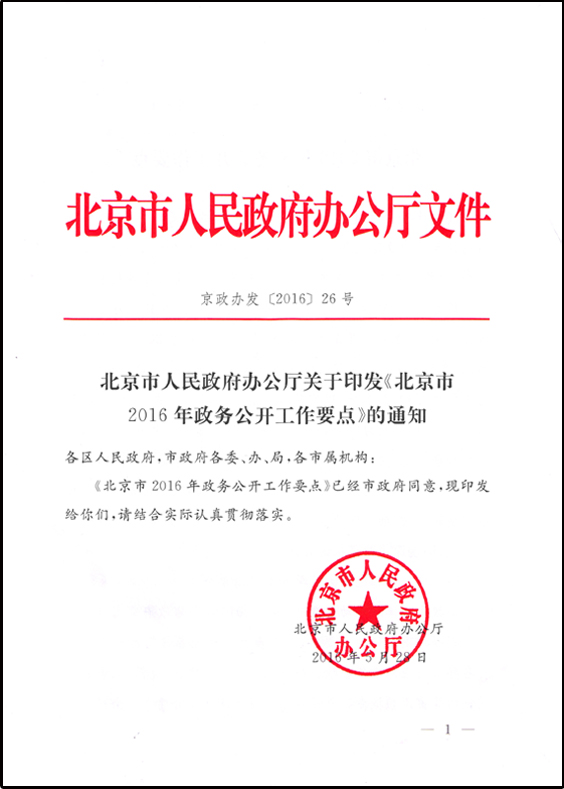


Formulate a three-level list of government affairs disclosure. Efforts will be made to solve the problems of wide scope of government affairs disclosure, large amount of information, inconsistent standards, and difficult quantification of assessment, and the "Three-level List of Government Affairs Disclosure in Key Areas of Beijing" covering three administrative levels of city, district and street (township) will be formulated and published. For the first time, the list extends from the municipal departments to the grassroots level, including 559 items of directory information and 2828 content standards in 47 fields at the municipal level, 339 items of directory information and 1832 items of content standards in 44 fields at the district level, and 61 items of directory information and 249 items of content standards in 13 fields at the street (township), thus establishing a systematic, industrial and operational standard for the openness of government affairs. Clarify the subject, content, standards, methods and procedures of government affairs disclosure in accordance with the law and regulations, refine the tasks of government affairs disclosure in key areas of administrative organs at all levels, specific to the content standards of each information, implement the responsible subject, and realize the quantification, assessment and good supervision of public work.
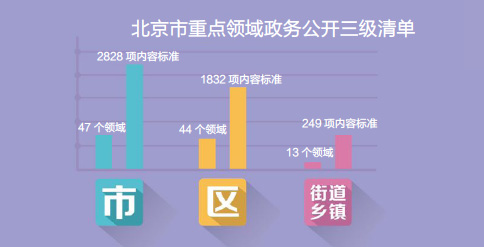

Three-level list of government affairs disclosure in key areas of Beijing
Innovating the application of QR code in government affairs disclosure. Improve the level of openness and informatization of government affairs, enhance the influence of government information dissemination, optimize government management services, and carry out innovative application of QR codes from different angles such as focusing on the overall situation, serving enterprises and benefiting citizens. "Sweep" to realize the cross-screen dissemination of government information, and realize the cross-screen transformation and extended reading of different carriers through reading, downloading, storing policy documents, service guides, graphic interpretation, etc. on the mobile phone client; "Sweep" to realize government services, and transform all kinds of convenience services into two-dimensional codes, so as to realize the functions of filling out forms, making appointments, reporting materials and so on; "Sweep" realizes the integration of online and offline, further expands the scope of policy interpretation and measures to benefit the people, enhances the convenience of public affairs, and openly promotes service optimization.
Innovatively run the "Top Citizen Dialogue" interactive program between government and people. During the "two sessions" of the city, around the government work report and the hot issues of public concern, 12 special programs of "Beijing’s New Expression of the Leader of Citizen Dialogue" were continuously produced and broadcast in the form of all-media integration, which were broadcast on radio, television, internet and other platforms, and collected more than 100,000 opinions and suggestions from netizens. In the middle of the year, around the major theme of Beijing-Tianjin-Hebei coordinated development, a special program "Beijing-Tianjin-Hebei coordinated development" was planned and produced. For the first time, the principals of transportation, environmental protection, commerce and other departments in Beijing-Tianjin-Hebei were invited into the live broadcast room to interact with the citizens in real time and respond to their concerns. The average audience rating exceeded 3% and the audience exceeded 100 million. Formulate and issue the Work System of "Top Citizen Dialogue Program", and institutionalize the whole-process interaction, all-media coverage and comprehensive presentation of radio, television, internet and new media.


Leader of citizen dialogue
(B) focus on all-media integration, interpretation and response to achieve new breakthroughs.
Major policies to achieve "directory management, combination interpretation". Establish a "three-synchronization" mechanism for the important documents and major policies of the municipal government, and simultaneously draft, mark the public attributes and formulate interpretation plans. Around the municipal government’s important decision-making arrangements, important meetings, phased key work, important activity arrangements and hot issues of public concern, timely release authoritative information. Throughout the year, 140 key work interpretation catalogues in 9 aspects were determined, and important documents were simultaneously publicized and interpreted to create a good atmosphere for the implementation of policies and measures. The organization column focuses on the interpretation of the 2015 annual performance appraisal meeting of the municipal government, the special supervision of promoting private investment in the State Council, the third major supervision in the State Council and the centralized supervision of major decision-making tasks in this city, so as to promote implementation in an open manner. Organized more than 10 press conferences, published more than 60 articles and published more than 200 reports through new media around important documents such as the Outline of the Thirteenth Five-Year Plan for Beijing’s National Economic and Social Development and Opinions on Accelerating the Development of Ice and Snow Sports (2016-2022). During the "two sessions" in 2016, newspapers, radio, television, internet and government affairs Weibo WeChat all-media resources were deeply integrated, and the government work report was deeply interpreted. The column "Seal of Beijing in 2015" was opened in Beijing Daily, and 14 special editions of government work reports were published continuously, with a total of more than 70,000 words. In the "window of the capital" government portal, "Beijing published a special column such as "Micro-interpretation of government work report published on Weibo WeChat and other online platforms", which was forwarded and clicked by more than one million people on the Internet. Focusing on six major themes, such as steadily improving the quality of economic development, "removing", "governing" and "advancing" to accelerate the supply-side structural reform, the city’s economic situation was deeply interpreted through radio, television, internet and new media through multiple channels and platforms.
Important government meetings achieve "deep interpretation and three-dimensional voice". The in-depth interpretation mechanism of the executive meeting of the municipal government was established, and the interpretation materials were published in newspapers and accessed online the next day after the executive meeting of the municipal government was held. In Beijing Daily, "Interpretation Column of the Standing Committee of the Municipal Government" was set up, and 67 important topics of 31 executive meetings of the municipal government were deeply interpreted. A total of 67 articles with more than 120,000 words were published. Set up conference topics on the "Window of the Capital" government portal website, and timely publish conference topic diagrams, which will be released to the public through new media. Establish a team of experts in policy interpretation, give full play to the advantages of policy makers, professional institutions, experts and scholars, and enhance the pertinence, scientificity and authority of policy interpretation.

The major public opinion response realizes "timely response and coordinated linkage". In response to major public opinions in the field of people’s livelihood, such as urban planning, environmental protection transportation, medical education, food safety and so on, we will do a good job in response in time, and release authoritative information through press conferences and government affairs Weibo WeChat at the first time to clarify the facts in time and eliminate adverse effects. Strengthen the collaborative linkage of news media, coordinate traditional media, network platform and new media, realize the "double micro" service interoperability of Weibo WeChat, and the government affairs Weibo Group and the spokesperson Weibo Group responded together.

Interpreting the response platform and realizing "authoritative release and all-media integration". Establish and improve the press conference system, and continue to promote the establishment of routine press conference system for functional departments that are closely related to macroeconomics and people’s livelihood and have more social concerns. The Information Office of the Municipal Government held nearly 70 press conferences, and more than 1,000 domestic and foreign media attended the press conferences. In the "Window of the Capital" government portal, a column of "Policy Interpretation" was set up, and sections such as "Seeing the New Deal" and "Counting Beijing" were set up. Deepen the expansion of the new media publishing platform for government affairs. The "Beijing Publishing" new media platform for government affairs published more than 8,500 pieces of information, with a fan base of 12.61 million. WeChat WeChat official account pushed more than 360 times and posted more than 2,400 messages; The cumulative reading of headline numbers was 39.17 million. More than 200,000 pieces of information have been published in the new media matrix of government affairs of "Beijing Weibo Publishing Hall", which has achieved differentiated and differentiated dissemination and improved the efficiency of information dissemination.
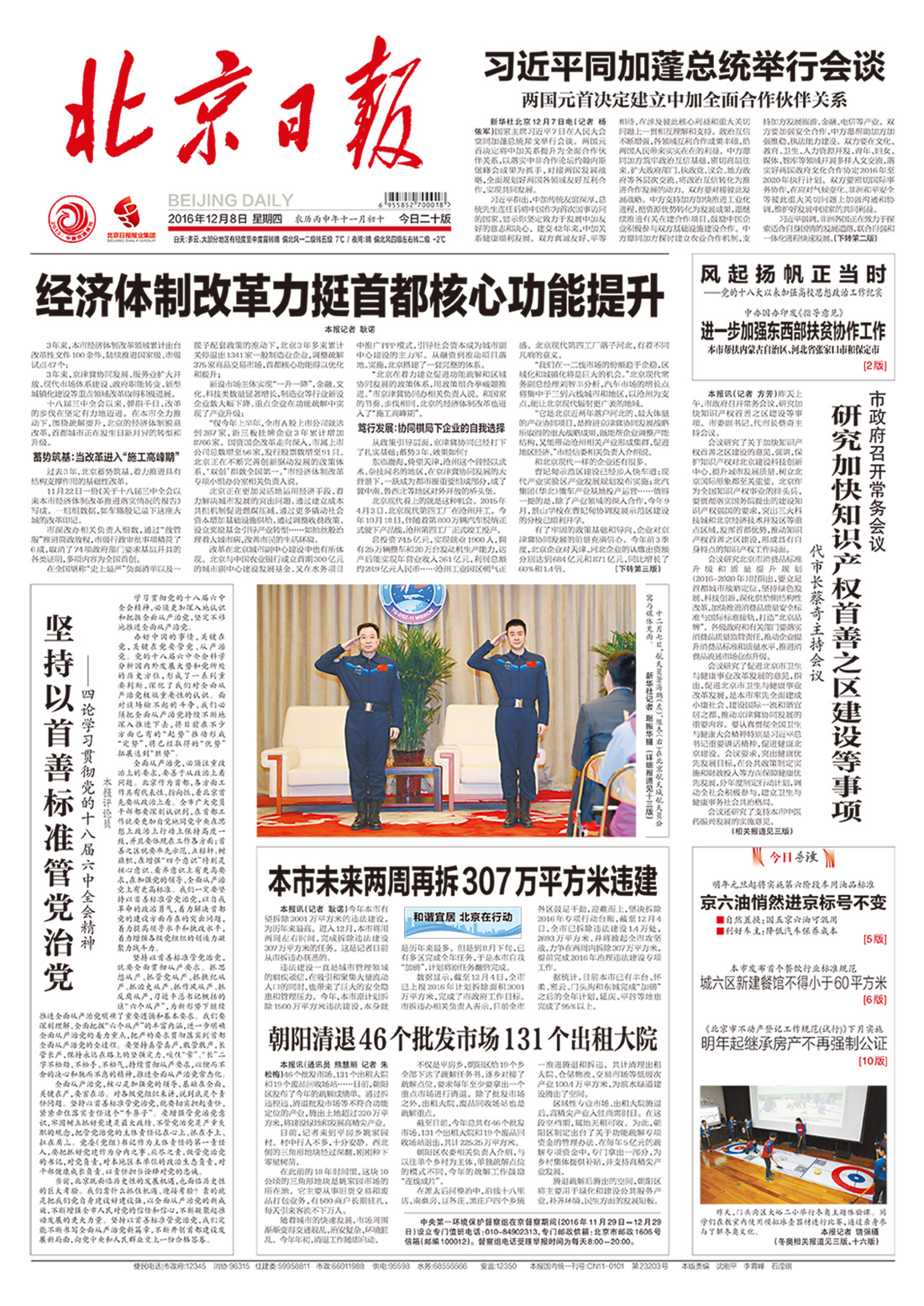
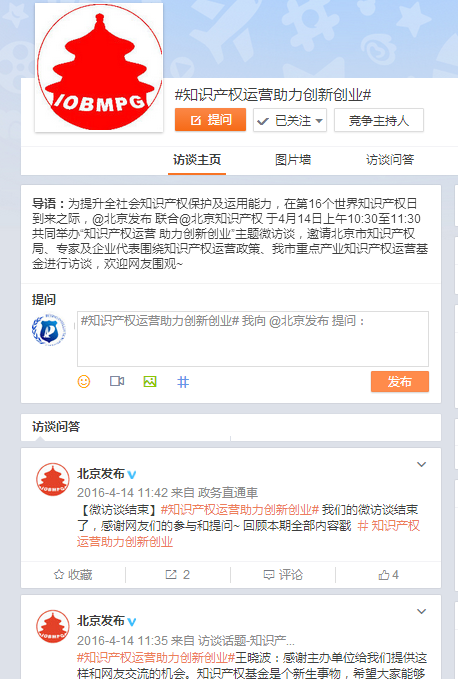
(3) Strengthen the construction of mechanism guarantee and lay a solid foundation for public work.
Strengthen the disclosure of work guidance according to the application. In view of the common problems existing in the disclosure by application and the lost cases, the government information disclosure by application work manual is formulated to guide municipal departments, grassroots governments and departments to improve the level of disclosure by application according to law. In the city’s administrative organs at all levels to carry out special evaluation of third parties according to the application, feedback the list of problems and rectification suggestions one by one, and urge to find weak links. Standardize the complaint handling process of government information disclosure, improve the complaint reporting channels, strengthen problem tracking and urge rectification.
Strengthen performance management and assessment supervision. The work of making government affairs public was included in the performance appraisal system of municipal departments in the city, and the score weight was increased to 5%. Municipal units are evaluated as "excellent" by the Municipal Housing and Urban-Rural Construction Committee, the Municipal Local Taxation Bureau, the Municipal Development and Reform Commission, the Municipal Health and Family Planning Commission, the Municipal Administration for Industry and Commerce, the Municipal Human Resources and Social Security Bureau, the Municipal Public Security Bureau, the Municipal Environmental Protection Bureau, the Municipal Civil Affairs Bureau, the Municipal Urban Management Committee, the Municipal Urban Management Law Enforcement Bureau, the Municipal Tourism Commission, the Municipal Agriculture Bureau and the Municipal Park Management Center. The "good" evaluations include Municipal Planning and Land Commission, Municipal Education Commission, Municipal Science and Technology Commission, Municipal Water Affairs Bureau, Municipal Statistics Bureau, Municipal Quality Supervision Bureau, Municipal Finance Bureau, Zhongguancun Management Committee, Municipal Transportation Commission, Municipal Agriculture Commission, Municipal Safety Supervision Bureau, Municipal Economic Information Commission, Municipal Finance Bureau, Municipal Audit Bureau, Municipal Sports Bureau, Municipal Letters and Calls Office, Municipal Legislative Affairs Office, Municipal Commerce Commission, Municipal Foreign Affairs Office, Municipal Food and Drug Administration and Municipal Prison. Dongcheng District, Xicheng District, Chaoyang District, Haidian District, Fengtai District, Fangshan District, Changping District, Daxing District, Pinggu District and Huairou District were rated as "excellent" by the district government.
Establish and improve the third-party evaluation mechanism of government affairs disclosure. Insist on finding problems by evaluation and promoting improvement by evaluation, and conduct third-party evaluation on the implementation of "five openness", disclosure of key areas, policy interpretation and response to concerns, and safeguard and supervision mechanisms by municipal departments and district governments. In view of the problems found in the evaluation, issue a list of problems to each unit respectively, and urge each unit to rectify and implement them.
Strengthen the normalization supervision of government website content construction. Give full play to the role of the third-party inspection and evaluation mechanism, carry out a "net-pulling" comprehensive inspection of the content construction of more than 1,000 government websites in the city on a quarterly basis, dig deep into problems, regularly report the inspection results, and put forward rectification suggestions, forming a virtuous circle of regular inspection, finding problems, timely reporting, rectification within a time limit, and improving quality and efficiency. In the quarterly spot check of the national government websites conducted by the General Office of the State Council, the qualified rate of this city reached 100%.
Strengthen the authoritative release of government gazette. Give full play to the role of the standard text of the government gazette. In the whole year, 57 issues of the gazette were edited and published, and 510 local regulations, government regulations, normative documents and reports were published. Improve the catalogue classification, increase the frequency of publication, achieve weekly publication, and send more than 900,000 paper bulletins to grassroots units such as communities, neighborhood committees and libraries (rooms) at all levels. Optimize the search function, publish the electronic bulletin online at the first time, and improve the utilization and timeliness of the electronic bulletin.
Conduct grassroots research. Facing the grass roots, highlighting services, organizing the municipal government departments and relevant experts and scholars, visiting and investigating the public work of 8 district governments, 63 district government departments, 12 streets (towns) and 4 institutions on the spot, strengthening the government information and government affairs public service oriented to the grass roots, getting a detailed understanding of the difficult problems in grassroots publicity, and deeply analyzing the crux of difficulties that restrict the effectiveness of work, so as to lay a solid foundation for studying and formulating more pragmatic and effective work measures and further improving the level of grassroots government affairs public work.
Do a good job in education and training. Formulate the work plan of government information and open government affairs training, clarify the training principles of hierarchical organization, comprehensive coverage of objects and rich and diverse forms, and clarify the specific arrangements for open government affairs training at the municipal level. Among them, the municipal government has held two sessions of public training on government information and government affairs, and participated in more than 800 trainings, thus achieving full coverage of business training for bureau-level leaders in charge of public work, heads of working institutions and staff of all district governments and municipal government departments.
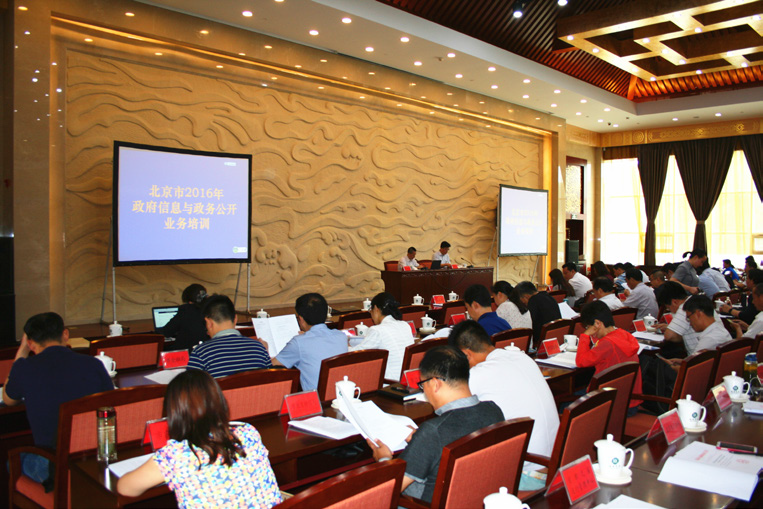
II. Information disclosure in key areas
(1) Promoting openness around deepening reform
Promote the disclosure of the power list and the responsibility list. Update and release the 2016 edition of the power list of administrative examination and approval, administrative punishment, administrative compulsion, administrative expropriation, administrative payment, administrative inspection, administrative confirmation, administrative reward, administrative ruling, etc., sort out and refine the information such as public authority matters, legal basis, implementation subject, operation process and supervision method one by one. Further clean up and streamline licensing matters, and the streamlining ratio has increased by about 10% on the original basis. All 197 non-administrative licensing examination and approval items implemented by the central government have been adjusted, and the list of administrative examination and approval items has been adjusted to the list of administrative licensing items. Promote the connection between "double random" spot checks and the social credit system, incorporate the results of random spot checks into the social credit records of market participants, and publicize them to the public in time.
Promote the publicity of the implementation of the "streamline administration, delegate power, strengthen regulation and improve services" policy. Focusing on streamlining matters, investment reform, standardizing management, stimulating vitality, market order, and government services, we will further promote the "streamline administration, delegate power, strengthen regulation and improve services" reform, hold a special conference on the "streamline administration, delegate power, strengthen regulation and improve services" reform, and publish a detailed list of 54 reform tasks to promote the integration of planning and land and urban management functions and improve service efficiency and level.
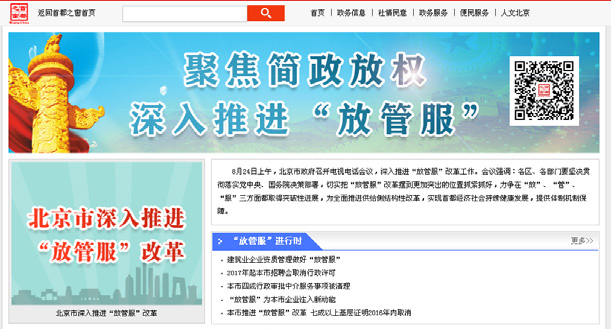

Focus on Simple Administration and Decentralization, Further Promote the "streamline administration, delegate power, strengthen regulation and improve services"
Promote the disclosure of food and drug safety information. Timely release punishment information, consumer warning information and typical case information that has a significant impact, regularly disclose sampling inspection information of food, medicines, medical devices and cosmetics, and timely release consumer warning information such as product recall, off-shelf information, adverse drug reactions, and medical device adverse event monitoring information. Realize the quantitative grading online inquiry of catering service units in the city.
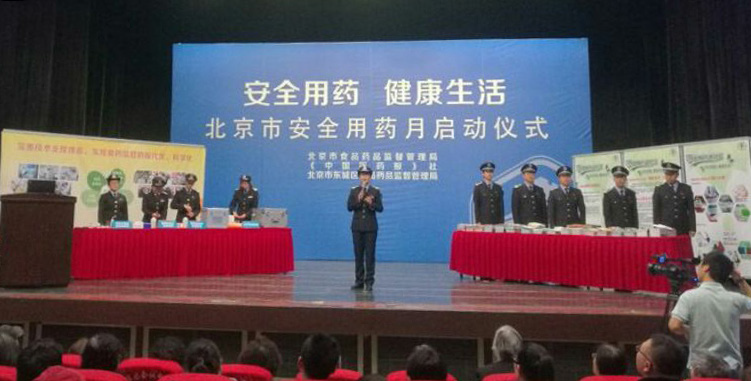

Food sampling information
Promote the disclosure of safety production supervision information. Timely release the administrative license, administrative punishment, law enforcement inspection and accident investigation of production safety. Regularly submit the information about the administrative punishment of safety production to the enterprise credit information network, and establish a "blacklist" system for untrustworthy enterprises.
Promote the disclosure of product quality supervision and law enforcement information. Timely disclosure of the annual work plan for product quality supervision, product quality supervision and spot checks, and relevant standards and regulations for the acceptance and approval of administrative licenses. Regularly disclose the information on the results of administrative punishment investigation.

Product quality spot check and supervision results
Promote the disclosure of regulatory information on the tourism market. Publish a "black and white list" of the tourism industry, establish "three mechanisms" such as quick verification of false tourism websites, pre-examination of commercial promotion and top-ranking of official website by the Tourism Commission, establish a regular information disclosure system for tourism complaints, publish a list of recommended "one-day tours" travel agencies in Beijing, and publicize illegal tourism websites to attract illegal calls.
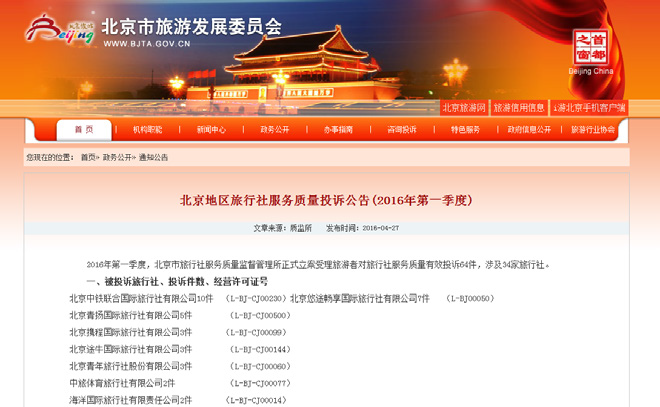

Recommended list of "one-day tour" travel agencies
Promote the disclosure of enterprise credit information. Formulate the Code for Collection of Credit Information of Beijing Enterprise Credit Information Network and the Catalogue of Information Resources, and collect 588 types of enterprise credit information. The enterprise credit information network publicized 30.214 million pieces of basic information of various enterprises, 248,000 pieces of license information and 569,800 pieces of warning information, and provided 1.632 billion information inquiries to the society. Promote the sharing and cooperation of government credit data with enterprises and social organizations. Realize the opening of enterprise credit network data to e-commerce platform, carry out the data exchange of enterprise subject information, quality supervision, consumer rights protection, etc., and promote the sharing, development and mutual assistance, reform and supervision interaction of government supervision data and e-commerce platform data resources by means of "administration+market+technology".

Beijing Enterprise Credit Information Network
Do a good job in making and selling fake and shoddy goods and disclosing information related to cases of administrative punishment for infringement of intellectual property rights. Regularly publish the progress and effectiveness of the work, and actively disclose the name of the case, the name of the person being punished or the name of the unit, as well as the main illegal facts and the types, basis and results of punishment for the cases of manufacturing and selling fake and shoddy goods and infringement of intellectual property rights investigated and dealt with by the general procedures.
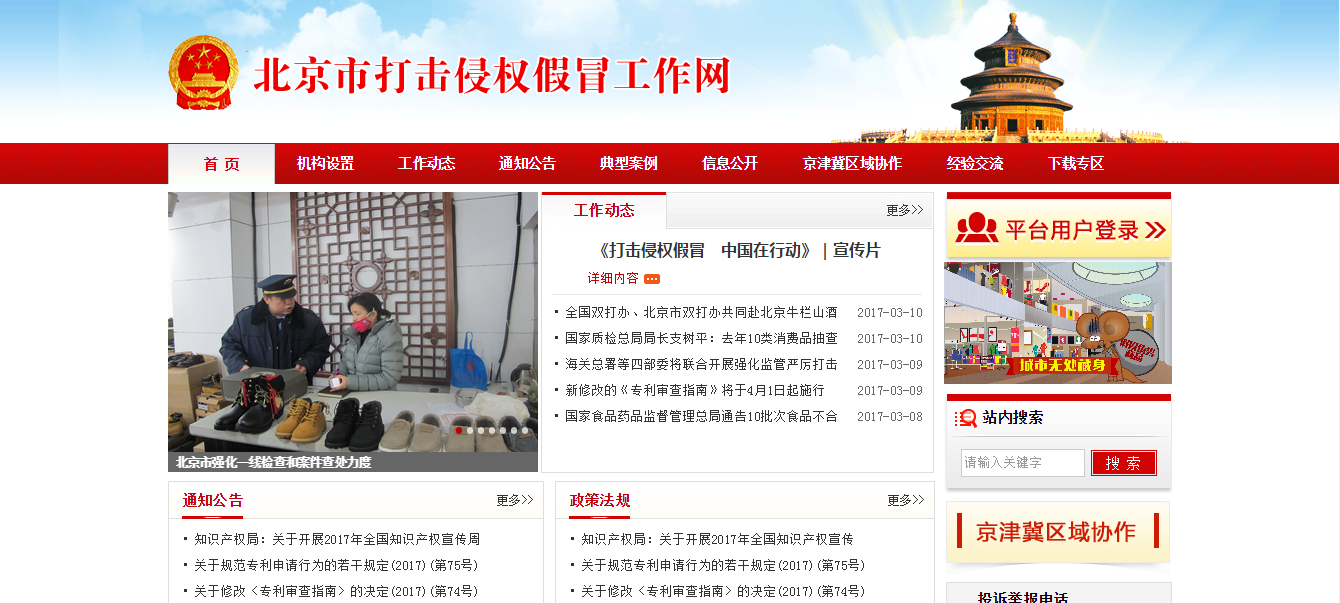

Beijing Work Network for Combating Infringement and Counterfeiting
Promote the openness of government services. Realize the full disclosure of administrative examination and approval services in the government affairs hall, and announce the project name, implementation subject, legal basis, work flow, application materials, commitment time limit, charging standards and basis, etc., so as to facilitate the masses to inquire. To promote the extension of government services to online processing, the public service platform of municipal government service center, the municipal online government service hall and the entity hall were put into operation simultaneously, realizing the "online and offline integration" of government services, providing 40 units and more than 700 municipal government services covering administrative licensing and service matters for the public and legal persons, and realizing the full-process online service functions of online booking, online declaration and online inquiry. Promote the disclosure of services for people who have moved to settle down, timely disclose the household registration policy, and deeply interpret the relevant policies of Beijing residence permit.
Promote the information disclosure of service enterprises. Construction of Beijing public information service platform, timely disclosure of economic and trade development fund project declaration, annual registration of foreign-invested enterprises, SME development support policies and other information. Timely release major business operation data and characteristic information such as retail sales of social consumer goods and two-way investment. We will improve the information reporting system and publicity platform for foreign-funded enterprises’ investment and operation, and implement measures for the integration of business and industrial registration matters for foreign-funded enterprises.
Promote the openness of public enterprises and institutions. Organize the compilation of information disclosure catalogues of public enterprises and institutions in the fields of medical and health care, environmental protection, urban water supply, heat supply and gas supply, and put forward standards and requirements for the compilation of public service items catalogues and service guides by public enterprises and institutions in this field, so as to facilitate enterprises and the public to handle affairs. The Municipal Water Supply Group, the Municipal Gas Group and the Municipal Thermal Power Group have compiled supporting documents such as the catalogue and guide of public services and the detailed rules for the implementation of public services.
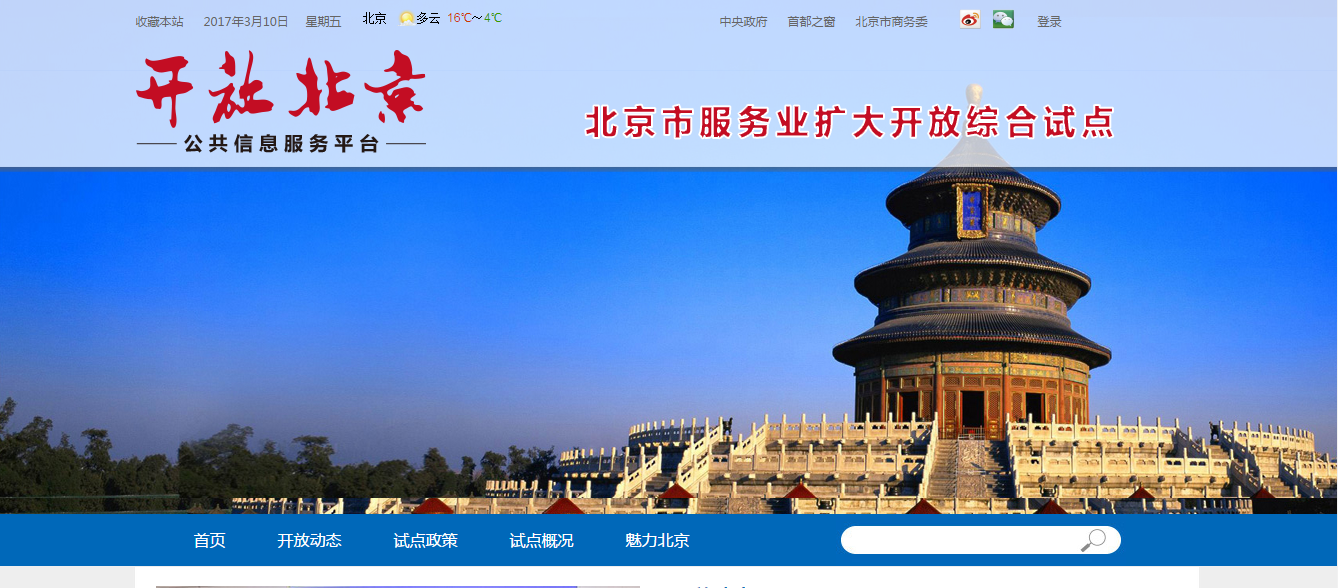

Comprehensive pilot project of expanding and opening up service industry in Beijing
(2) Promoting openness around promoting economic development
Promote the publicity of the coordinated development of Beijing-Tianjin-Hebei. Around the coordinated development of Beijing-Tianjin-Hebei, we have organized information release activities such as "Beijing’s new initiatives, new changes and new achievements", key projects for the coordinated development of Beijing-Tianjin-Hebei in 2016, and promoting the retreat of cultural relics. Timely release the relevant information of Beijing-Tianjin-Hebei medical institutions to carry out cooperative medical treatment. Through press conferences, interviews with the media and other forms, we will actively disclose to the public information on the coordinated development of industrial cooperation, transportation integration, intellectual property rights and talent flow in Beijing, and deeply interpret documents such as Beijing’s traffic development and construction plan during the 13 th Five-Year Plan period and the Beijing-Tianjin-Hebei system to promote comprehensive innovation and reform.
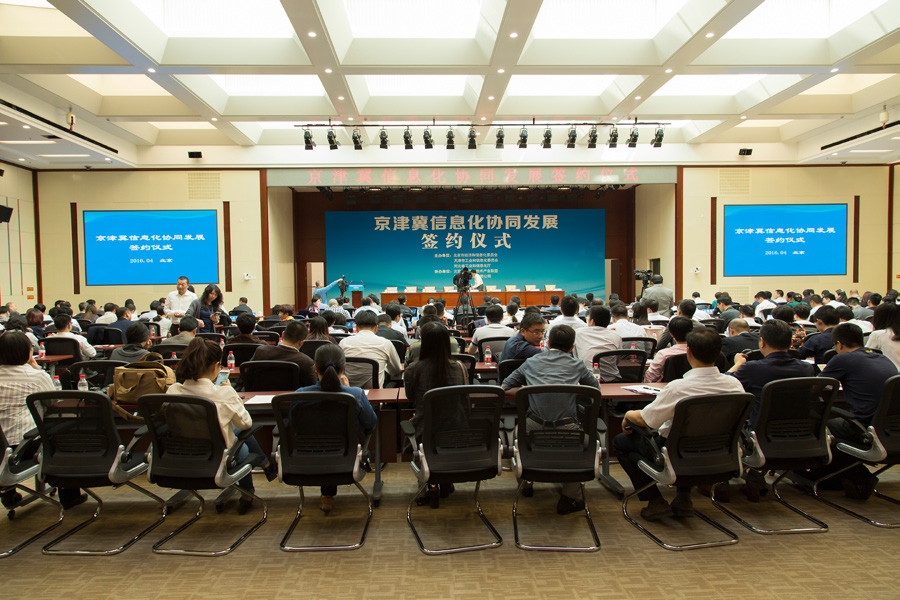


Make the implementation of supply-side structural reforms public. We will comprehensively interpret the ideas and effects of structural reform on the supply side, publicly add new industrial restricted catalogues, authorized operation of rail transit and other typical cases, and interpret the implementation of the city’s work in stabilizing growth, adjusting structure and sparse functions.
Promote the disclosure of relevant information on innovation and development. Timely carry out the interpretation of important policies such as the construction of national science and technology innovation center, the plan for strengthening national science and technology innovation construction in Beijing during the 13 th Five-Year Plan period, and the major special achievements of Beijing’s technological innovation action plan. Publish information about project collection and activity organization related to industrial technology innovation strategic alliance, as well as field project collection, technological breakthrough and industrial application in "high-tech" industries. Focus on promoting the construction of innovation and entrepreneurship service institutions, filing "Beijing Zhongchuang Space", publicizing science and technology policies, and promoting achievements transformation projects.
Promote information disclosure of major planning and construction projects. Carry out publicity and interpretation work around Beijing’s overall urban planning, planning and construction of urban sub-centers, special actions to investigate and deal with illegal construction, general survey of geographic information, various planning and construction laws and standards, etc., and interpret in detail the related issues of Beijing’s spatial strategic planning and urban sub-center planning through press conferences. Publicize the catalogue of key construction projects in Beijing in 2016, and timely publish 32 pieces of progress information around Beijing-Tianjin-Hebei coordinated development, environmental improvement projects, infrastructure construction, people’s livelihood improvement and "high-tech" industrial projects. Real-time public information on the permission and filing of construction projects, and public information on bidding, contract filing, contract performance, construction permission and completion filing of construction projects through the "Beijing Construction Market Information Open Platform". Timely disclosure of quality supervision and law enforcement inspection information of construction projects.
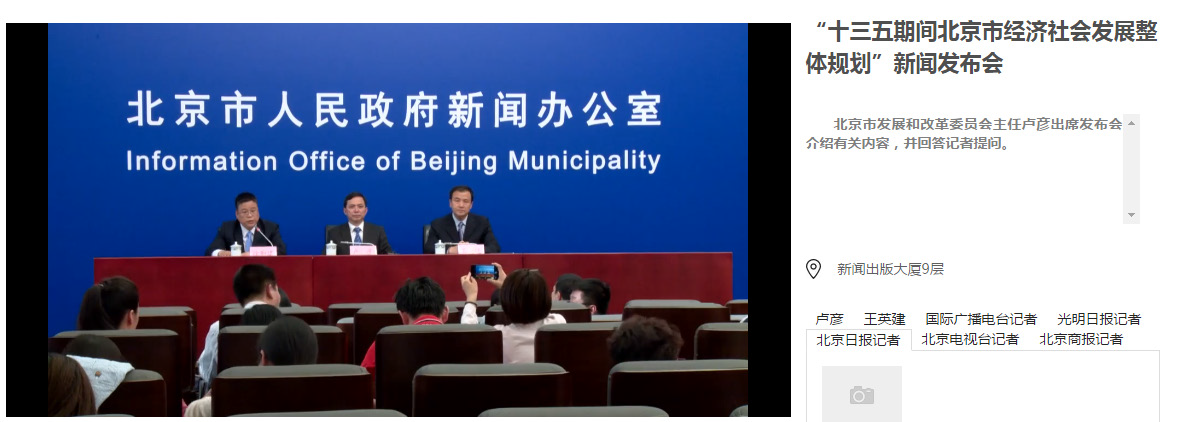
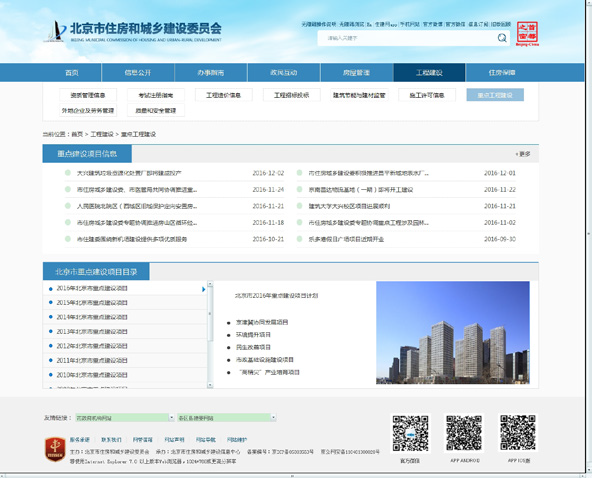

Construction market information disclosure platform
Promote the information disclosure of government and social capital cooperation projects (PPP). Collect and manage PPP project information at city and district levels at different levels, track the progress of PPP projects, and establish a PPP project information submission and management assessment system. Policy information such as "Beijing: included in the PPP demonstration project of the Ministry of Finance, with a maximum award of 8 million yuan" and "Beijing throwing" 3+5+5"PPP project spree "was released through the government Weibo WeChat to ensure that enterprises can keep abreast of the PPP-related policy trends.
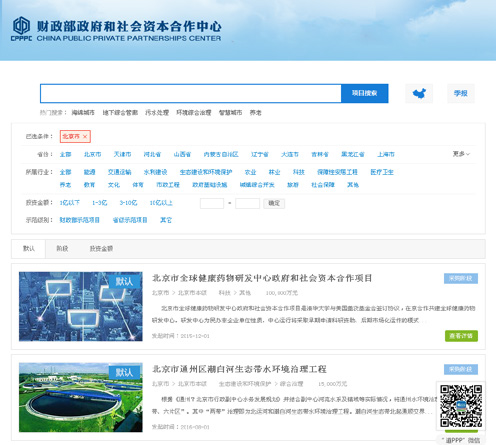
Promote the disclosure of public resource allocation information. Promote the data disclosure of public resource trading platforms, and integrate four public resource trading platforms, including bidding for construction projects, property rights and mineral resources, government procurement and integration. Timely disclosure of public resources trading project approval documents, administrative punishment information, bidding, market entities and intermediary qualifications and other information.
Promote the disclosure of tax reduction and fee reduction information. In-depth publicity was carried out to comprehensively promote the pilot reform of the camp, a press conference was held on the reform, a thematic report was carried out on "The tax burden of the camp is only reduced but not increased", and a centralized interview was organized on "Running out of the acceleration of the camp reform" to reflect the reform highlights and policy effects from multiple angles. Issued the "Notice on Strengthening the Management of Enterprise-related Charges and Reducing the Division of Key Tasks for Enterprises", and implemented the dynamic management of the list of administrative fees, enterprise-related administrative fees and government funds, and made them available to the public through the government website. Open public columns such as preferential policies for small and low-profit enterprises, R&D expenses plus deduction policies, and corporate restructuring tax policies, and disclose the policy contents in a timely manner.


Promote the disclosure of state-owned enterprise operation supervision information. According to the monthly disclosure of the appointment and dismissal of leaders of municipal state-owned enterprises, according to the annual disclosure of the overall operation of state-owned capital, the preservation and appreciation of state-owned assets and the assessment of operating performance. Promote the disclosure of information on the restructuring and reorganization of state-owned enterprises, timely release information on the reorganization of first-class enterprises, and require municipal enterprises to promptly disclose information such as property rights transfer, capital increase and share expansion, and asset transfer.
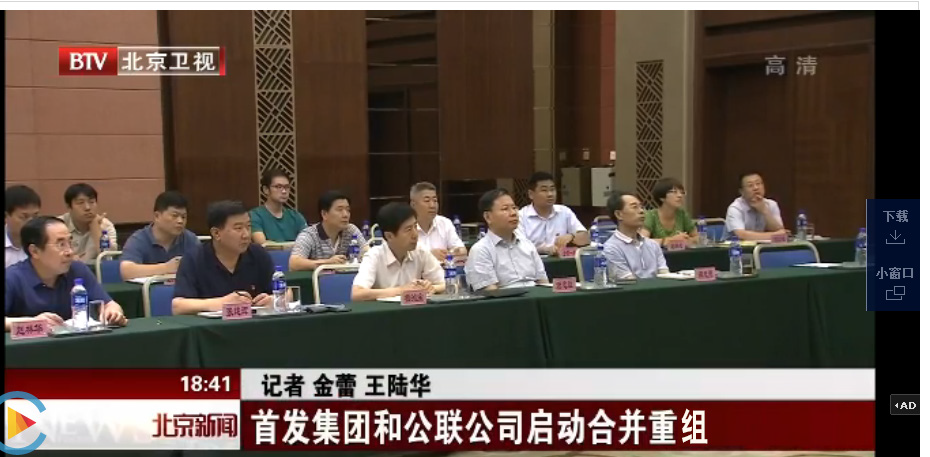
(3) Promoting openness around the improvement of people’s livelihood
Promote the disclosure of environmental protection information. Promote the disclosure of information on environmental quality, environmental planning, air pollution control, elimination of old motor vehicles, environmental supervision and law enforcement, environmental protection administrative examination and approval, ecological civilization construction, total emission reduction, environmental complaints and reports. Strengthen the disclosure of air quality information, timely release information on the start and termination of emergency plans for heavy air pollution, realize the disclosure of the whole process of environmental impact assessment and acceptance of construction projects, and realize the active disclosure of all indicators of supervisory monitoring data of key pollution sources. Promote the disclosure of drinking water monitoring information, and regularly publish the water quality status of municipal centralized drinking water. Improve the construction of enterprise environmental information disclosure platform, publish the list of key pollutant discharge units in 2016, and carry out special law enforcement inspection on enterprise environmental information disclosure.
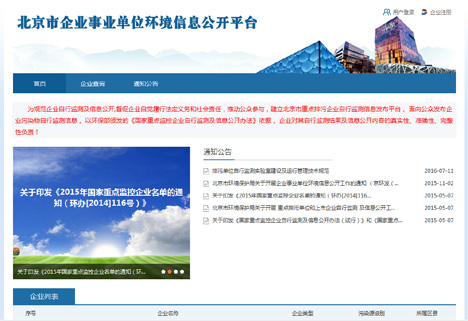
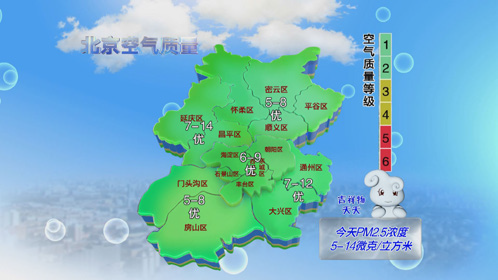

Elimination of old motor vehicles
Promote the disclosure of social assistance information. The information about the low-income target and the destitute personnel shall be disclosed monthly, and the development of medical assistance and temporary assistance shall be disclosed quarterly. Timely disclosure of disaster relief materials allocation information, municipal disaster prevention and mitigation demonstration community list. Do a good job in publicizing the registration information of charitable organizations, and set up a column of "Publicity of Charity Information". Establish a publicity platform for credit information of social organizations, and realize the unified online publicity of all kinds of credit information such as basic information, performance information, honor information and untrustworthy information of social organizations in the city, so as to facilitate public inquiry and supervision.
Promote the disclosure of employment and entrepreneurship information. We will build an all-media publicity platform covering "newspapers, television, radio, websites, Weibo, WeChat and community electronic screens", and jointly release major policies on employment and entrepreneurship. In the "Window of the Capital" government portal, a column of "mass entrepreneurship and innovation" is set up, which is divided into four sections: news trends, policies and interpretation, scientific and technological innovation services, activities and exchanges, and the policies and progress related to innovation and entrepreneurship are released centrally. Set up special service columns such as "Human Resources Market", "Foreign Specialized Service", "Personnel Examination", "People’s Employment", "College Student Village Officer" and "Professional Skills Appraisal", and timely release the latest policies and interpretation materials. Organize the Zhongguancun Pilot Policy Presentation, and conduct 24-hour online telephone consultation and answering questions on entrepreneurship and innovation policies.
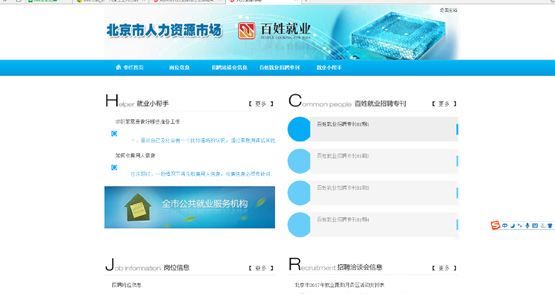
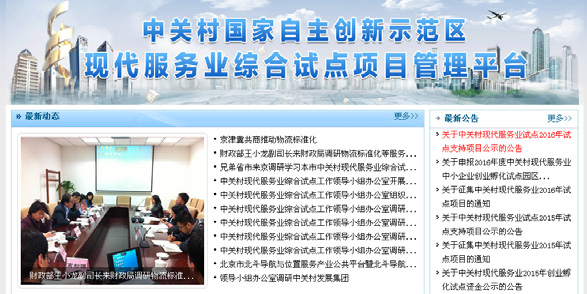

The mass innovation entrepreneurship
Promote the information disclosure of shantytown renovation, affordable housing and rural dilapidated housing renovation. Open a column of "shantytown renovation project", and actively disclose the preliminary work of shantytown renovation, the transaction announcement and transaction results of one-time bidding project for land use rights. Open the shantytown renovation policy and preparation data, and open the number of housing units (households) for shantytown renovation and resettlement in each district and the number of housing units (households) for shantytown renovation and resettlement basically completed. Carry out special supervision on shantytown renovation, and timely disclose the supervision work and the phased completion of shantytown renovation tasks to the public. Timely disclosure of affordable housing construction, distribution, withdrawal and other information, the establishment of urban housing security information disclosure linkage mechanism. Do a good job in the information disclosure of the renovation of rural dilapidated buildings, and timely disclose the task decomposition, subsidy object scope and subsidy standards, construction standards, fund raising and other contents of the renovation of rural dilapidated buildings in relevant areas.

Housing security column
Promote the disclosure of educational information. Systematic disclosure of compulsory education enrollment information, compulsory education scribing work procedures, contents, results, enrollment methods, enrollment processes, certificate requirements and handling methods for accompanying children, and acceptance of social supervision. We will fully implement the "sunshine project" for college enrollment, and continue to promote the disclosure of information such as enrollment methods, admission procedures, finance, consultation and appeal channels, and handling results of major violations in municipal colleges and universities. We will continue to do a good job in deepening the reform of the examination enrollment system, the second three-year action plan for preschool education, the cross-training plan for high-level talents, and the information disclosure work for education and teaching reform.
Promote the disclosure of medical and health information. Promote the disclosure of information on the epidemic situation of legal infectious diseases, and publish the incidence of legal infectious diseases and the incidence trend of key epidemics every week. Publish the information disclosure catalogue of nine types of medical and health institutions, such as hospitals and family planning technical service institutions, and make clear provisions on the scope, catalogue, standard and form of disclosure, so as to guide the information disclosure of medical and health institutions to the society and clients. Promote the disclosure of graded diagnosis and treatment information, and publish and interpret the annual key tasks of grading diagnosis and treatment system construction.
(D) promote openness around the government’s own construction.
Improve the open system of government meetings. We will promote the opening of meetings as an important starting point for the openness of decision-making, and establish and improve the system of stakeholders, the public, experts and the media to attend relevant meetings of the municipal government as nonvoting delegates. The municipal government has repeatedly invited representatives of citizens and news media to attend the executive meeting of the municipal government to enhance the transparency of decision-making; Municipal administrative organs and district government performance evaluation meeting invited representatives of the Municipal People’s Congress, CPPCC members, experts and scholars, university representatives, business representatives, citizens’ representatives, news media representatives and other parties to participate in the joint evaluation and scoring. The district government, municipal government departments invited representatives of relevant parties to attend the meeting as nonvoting delegates into the annual performance appraisal. The pilot district government executive meeting was open, and the Xicheng district government executive meeting was broadcast live, which formed an open government meeting mode of "on-site and off-site representatives offering suggestions, online and offline interactive communication between the government and the people".
Promote the pre-disclosure of major decisions. Establish a pre-disclosure mechanism for major administrative decisions, disclose the draft decision-making and decision-making basis to the public before making decisions on major administrative decision-making matters, such as important reform plans, important policies and measures, and major construction projects, which involve the vital interests of the masses and need to be widely known by the society, and announce the collection and adoption of public opinions in an appropriate way. For decision-making matters of high social concern, such as "Beijing Urban Planning and Construction Management Opinions", "Beijing Integral Settlement Management Measures (Trial)" and "Beijing Implementation Opinions on Deepening Reform and Promoting the Healthy Development of Taxi Industry", relevant information will be disclosed to the public before formal documents are formed, public opinions and suggestions will be collected, and the adoption of opinions will be fed back.
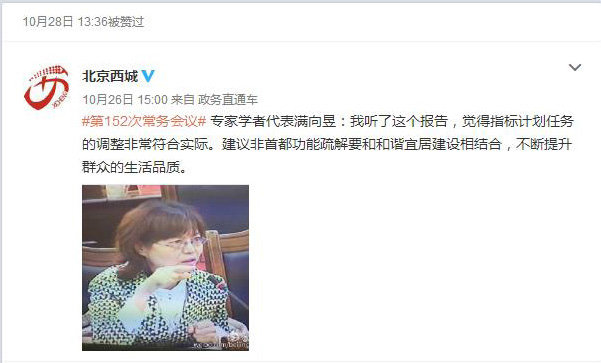
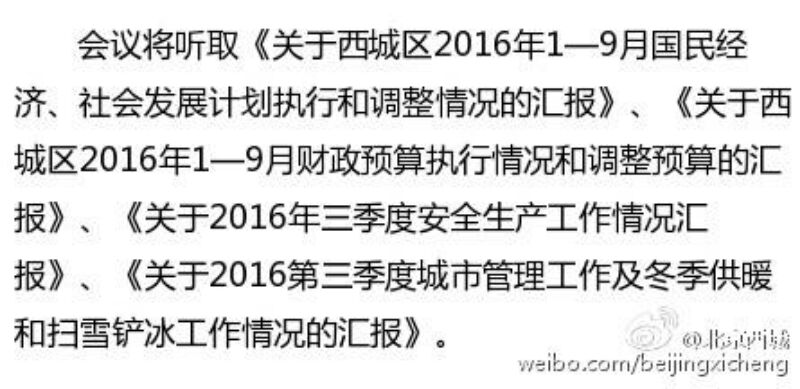
Carry out a public opinion survey system on major livelihood decision-making matters. Before making decisions involving the vital interests of the people, actively introduce public opinion surveys and expand public participation. Do a good job in the column "Demand and Feedback of Beijing Municipal Government Service Hotline 12345" as an important window to collect public opinions, gather people’s wisdom, resolve people’s grievances and solve people’s worries. Invite experts in social assistance, old-age care services, planning and other aspects to deeply participate in the discussion and formulation of policy documents such as social assistance implementation measures and home-based old-age care services. In the policy system and implementation process of "non-emergency comprehensive appointment" in municipal hospitals, we attach great importance to the feedback of people’s feelings and public opinions, hold a consultation meeting on non-emergency appointment registration, and invite representatives from elderly patients, parents of children, social security patients, foreign patients and other categories to put forward opinions and suggestions on the use interface and appointment process of the appointment registration mobile platform.


Non-emergency comprehensive appointment
Promote the disclosure of financial budget and final accounts information. The government’s budget and final accounts have been made public in the "full caliber" of the "four budgets". The government’s budget and final accounts and departmental budget and final accounts have all been made public to the lowest "item"-level subjects classified by function, and the "paragraph"-level budget of financial allocation for basic expenditures has been made public according to economic classification. The public matters include the overall revenue and expenditure of each department, financial allocation, project expenditure, overall performance targets of the department, and all the "three public" funds arranged by financial allocation. Newly-added public departments and agencies operating expenses, possession and use of state-owned assets, government procurement information, etc. According to the region, according to the project to open the city to the district transfer payment information. Further clarify the subject, scope, content, form and time limit of the disclosure of budgets and final accounts in various districts.
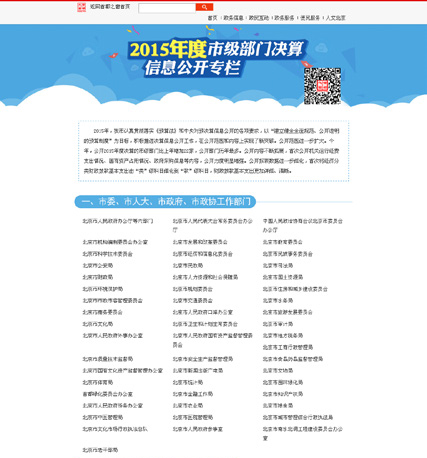
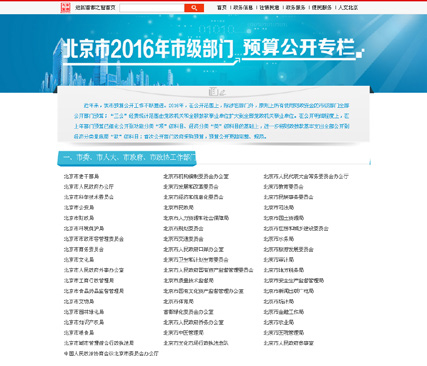
Promote the disclosure of information processing results of suggestions and proposals. In accordance with the relevant requirements of the Notice of the General Office of the State Council on Doing a Good Job in the Disclosure of the Results of the Proposals of NPC Deputies and the Proposals of Committee Member Chinese People’s Political Consultative Conference (Guo Ban Fa [2014] No.46), a summary of the suggestions and proposals handled by the municipal government was made public in the column of "Undertaking National Proposals" on the government portal of "Window of the Capital". Among them, of the 15 suggestions and proposals sponsored by the municipal government, 11 suggestions and proposals were made public after examination, and the other 4 suggestions and proposals were not made public according to law.
Third, information disclosure data
(a) take the initiative to disclose the situation
In 2016, 1,000,912 pieces of government information were voluntarily disclosed, 9,660 pieces of normative documents were voluntarily disclosed, and 732,739 pieces of government information in key areas were voluntarily disclosed. Among the key areas of government information that are voluntarily disclosed, there are 3475 items of financial budget final accounts, "three public funds" and administrative funds information; 1,467 pieces of information on the construction plan of affordable housing projects, the start and completion of projects, and the distribution and withdrawal of affordable housing; 373,368 pieces of information such as food safety standards, food production and operation licenses, special inspections and rectification; 5,841 pieces of information such as environmental verification and approval, environmental status bulletin and serious environmental emergencies; 3,439 pieces of information such as illegal bidding behaviors and their handling, and projects that should be tendered according to law with state-owned funds as the holding or leading position; 5091 pieces of information on government measures, disposal progress, risk early warning and preventive measures of production safety accidents; 3,659 pieces of information, such as the approval of agricultural land conversion to construction land, the approval of collective land expropriation, the announcement of land expropriation, the announcement of land expropriation compensation and resettlement, and the settlement of collective land expropriation; 388 items, prices, basis, implementation time and scope of government-guided prices, government pricing and adjustment of charging standards; 293,985 warning information and good information in the enterprise credit information system of this Municipality; 612 pieces of information such as audit results of government budget implementation; 14,869 pieces of information on the supervision and management of public enterprises and institutions closely related to the interests of the people by administrative organs;Other information that the municipal government decided to voluntarily disclose 26545.
The disclosure of government information through different channels and ways, among which 4,899 pieces of government information were disclosed through the government gazette, accounting for 0.38% of the total; 921,908 pieces of government information were published on government websites, accounting for 71.19% of the total; Government affairs Weibo made public government information 226,278, accounting for 17.48% of the total; Government WeChat disclosed 66,479 pieces of government information, accounting for 5.13% of the total; 75,367 pieces of government information were made public by other means, accounting for 5.82% of the total.
(Because the same government information can be disclosed in various channels and ways, the sum of classification is greater than the total number of voluntary disclosure. )
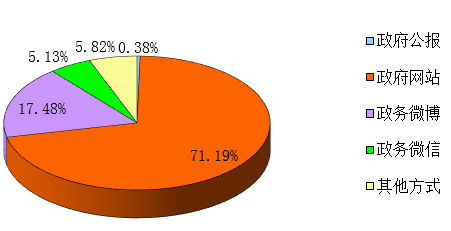
(2) Responding to the interpretation.
In 2016, the city responded to public concerns or major public grievances for 22,305 times. In the way of responding to interpretation, he participated in or held 1093 press conferences (the main responsible comrades participated in 395 press conferences); 350 online interviews on government websites (the main responsible comrades participated in 156 online interviews on government websites); 10719 policy interpretation manuscripts were released; Weibo WeChat responded to the incident 34097 times; Other ways responded to the incident 16933 times.
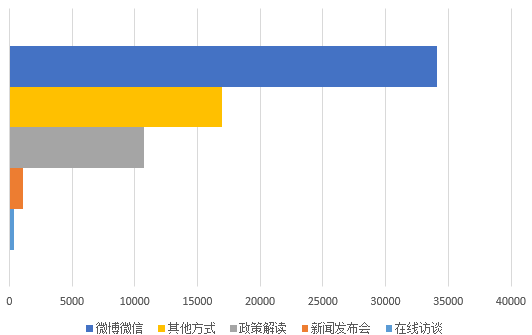
(three) according to the application for disclosure.
1. Application status
The total number of applications in the city is 34,200. Among the application methods, 18,266 applications were made in person, accounting for 53.25% of the total; 84 applications were made by fax, accounting for 0.24% of the total; 3,394 applications were submitted through the Internet, accounting for 9.89% of the total; 12,558 applications were made by letter, accounting for 36.62% of the total. (Because the same application can be filed in multiple ways, the sum of classified applications is greater than the total number of applications. )
(Because the same application can be filed in multiple ways, the sum of classified applications is greater than the total number of applications. )
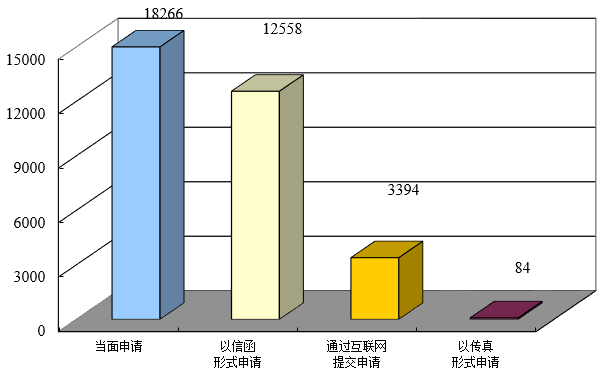
Among the municipal government departments, the top five applicants are the Municipal Public Security Bureau, the Municipal Planning and Land Commission, the Municipal Housing and Urban-Rural Development Commission, the Municipal Administration for Industry and Commerce, and the Municipal Food and Drug Administration. Among the district governments, the top five applications are Haidian District, Xicheng District, Dongcheng District, Fengtai District and Chaoyang District.
2. Response
The number of 34,200 applications in the city was 33,149, of which 31,290 were completed on time and 1,859 were postponed. The rest of them did not reply in 2017 according to the time limit stipulated in the Regulations on the Openness of Government Information in People’s Republic of China (PRC).
Of the 33,149 applications that have been answered, 1,293 are "within the scope of voluntary disclosure", accounting for 3.90% of the total; 11,909 "consents to disclosure", accounting for 35.93% of the total; There were 296 "consents to partial disclosure", accounting for 0.89% of the total.
There were 6,689 cases of "disapproval of disclosure", accounting for 20.18% of the total. Among them, 80 pieces of state secrets are involved; Involving 53 trade secrets; 99 cases involving personal privacy; 25 cases endangering national security, public safety, economic security and social stability; Not 5829 pieces of government information referred to in the Regulations on the Openness of Government Information in People’s Republic of China (PRC); 618 other circumstances stipulated by laws and regulations. (Because the same application may involve more than two cases of "disapproval of disclosure", the sum of classification is greater than the total. )
There were 2,424 "not disclosed by this administrative organ", accounting for 7.31% of the total.
9020 "application information does not exist", accounting for 27.21% of the total.
There were 1,104 "informing to make changes and supplements", accounting for 3.33% of the total.
There were 414 cases, accounting for 1.25% of the total.
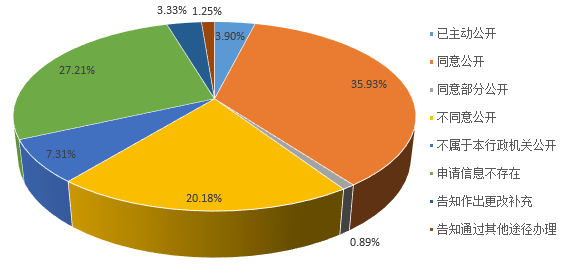
3 according to the application of public government information charges.
The administrative organs in the city charge 71,000 yuan for searching, copying, mailing and other fees for providing government information upon application in accordance with the Measures of Beijing Municipality on Charging Administrative Organs for Providing Government Information upon Application (No.2571 [2014] of Beijing Development and Reform Commission). At the same time, for rural five-guarantee recipients, urban and rural residents’ minimum living guarantee recipients, and special care recipients who receive state pension subsidies, the relevant expenses are exempted in accordance with the law, totaling 3205.89 yuan.
(four) administrative reconsideration, litigation and reporting.
1. Administrative reconsideration
The city’s administrative organs accepted 1827 cases of administrative reconsideration of government information disclosure, including 631 cases accepted by the municipal government, 850 cases accepted by the 16 district governments and 346 cases accepted by the municipal government departments with administrative reconsideration functions. Among them, 1,005 pieces of information disclosure replies made by administrative organs were maintained, 256 pieces of information disclosure notices made by administrative organs were revoked, 50 pieces of information disclosure notices made by administrative organs were confirmed to be illegal, 6 pieces of administrative organs were ordered to perform their statutory duties within a time limit, 42 pieces of applicants’ applications for administrative reconsideration were rejected, 68 pieces of applicants voluntarily withdrew their applications for reconsideration and terminated the trial, 238 cases were closed by other means, and 162 cases were not concluded.
2. Administrative litigation
The city’s courts have tried 2576 administrative litigation cases related to government information disclosure. 1,574 cases of first instance were accepted. Among them, 395 claims were rejected, 133 administrative actions were completely revoked, 8 administrative actions were partially revoked, 5 administrative organs were judged to perform their statutory duties, 49 cases were judged to be illegal, 727 cases were dismissed, 86 cases were dismissed, 58 cases were transferred to other courts, and 113 cases were not concluded. Accepted 1002 cases of second instance. Among them, 288 judgments were upheld, 4 judgments were revoked, 597 rulings were dismissed, 1 ruling was sent back for retrial, 5 rulings were withdrawn, and 107 cases were not concluded.
Step 3 report
The city’s administrative organs received 519 reports related to the disclosure of government information. Among them, the Office of Information and Government Affairs Openness of the Municipal Government has received 65 reports related to the disclosure of government information (including 13 suggestions for informants to report to other relevant units). Of the 52 accepted reports, 4 were found to be true and 48 were inaccurate. The municipal administrative complaint center received a total of 1 complaint related to the disclosure of government information, which was transferred to the relevant units in accordance with the working procedures, but it was found to be inaccurate after investigation.
(5) Institution building and security training.
In 2016, the number of specialized agencies for government information disclosure in this city was 904, and 1489 points for government information disclosure were set. There are 3,398 staff engaged in government information disclosure, including 556 full-time staff and 2,842 part-time staff. The special fund for government information disclosure is 9.0107 million yuan. The city held 2101 meetings or special meetings on government information disclosure throughout the year; Held 1216 training courses of various types; There were 55,026 trainees.
Fourth, the existing shortcomings and improvement measures
(A) the existing deficiencies
First, the depth and breadth of openness still need to be further deepened and expanded. The openness of government affairs involves the whole process of "decision-making, implementation, results, management and service" in the operation of administrative power, and also involves new tasks such as public participation, meeting opening and data opening. There is still a certain gap between the existing openness and the expectations of the public. Second, policy interpretation and response to concerns need to be further strengthened. The pertinence and effectiveness of policy interpretation need to be strengthened, the content of interpretation is not grounded enough, and the work of clarifying false information and responding to concerns is not timely and proactive. Third, the level of grass-roots government information and government affairs disclosure needs to be further improved. Some grass-roots units are relatively weak in public work and their working ability needs to be strengthened.
(II) Improvement measures in 2017
The first is to further promote the standardization of grassroots government affairs openness. Select grass-roots pilot units in the whole city, focus on the general planning of grass-roots land use, tax collection, land acquisition compensation, environmental governance, public utilities investment and other public concern information, as well as government services such as labor and employment, social insurance, social assistance, homestead approval, agricultural subsidies, medical and health care, and carry out the standardized pilot work of "five openness" to form standards and norms for grass-roots government affairs disclosure.
The second is to further promote the dynamic management of the three-level list of government affairs disclosure. Promote the implementation of the three-level list of government affairs disclosure in key areas, urge and guide administrative organs at all levels to "make the information involved in the list public", and timely revise, improve and dynamically update the three-level list of government affairs disclosure.
The third is to further strengthen the construction of government public opinion response mechanism. Establish and improve the mechanism of collection, consultation, judgment, response and evaluation of government public opinion, and issue detailed rules for the implementation of government public opinion response by administrative organs of this Municipality. Strengthen the construction and management of public platforms such as government websites, promote the intensive construction of websites, strengthen the linkage between government websites and major news media, news websites and commercial websites, and enhance the clustering and diffusion effect of websites.
The fourth is to further improve the level of disclosure according to the law. In view of the common problems existing in the third-party evaluation of the disclosure of applications and the lost cases, the outstanding problems in the acceptance, handling and reply of applications are sorted out and summarized, and operational suggestions are put forward one by one to guide administrative organs at all levels to improve the standard of disclosure of applications according to law.
The fifth is to further promote public participation and interaction between the government and the people. Focusing on the work of the government center, we will refine the scope of public participation, fully introduce the public participation mechanism in all aspects of policy formulation, implementation and supervision, and study the relevant work opinions of making major administrative decisions public, expanding public participation by administrative organs, and strengthening the interaction between the government and the people.
The sixth is to further carry out all-round multi-level and diversified business training. Organize and carry out special training for bureau-level leaders, department-level backbone training, systematic business training and online special training, include government affairs publicity in the initial training for civil servants and in-service training courses for cadres, and the "online learning for cadres" course system, and support government affairs publicity staff to receive relevant continuing education.



















































